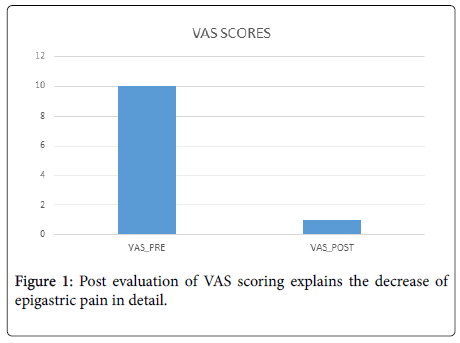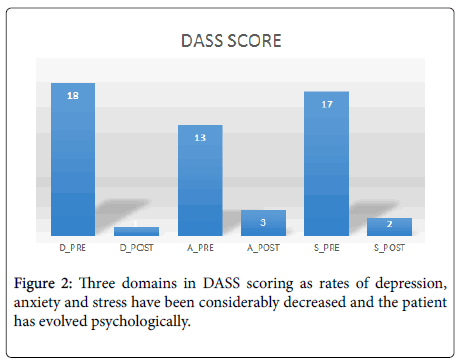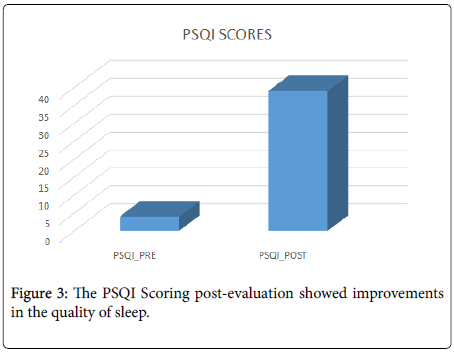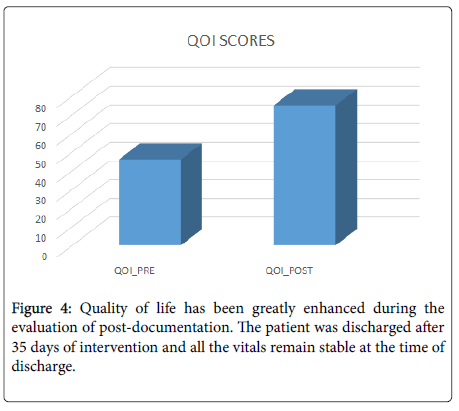Efficacy of Short Term Naturopathy and Yogic Interventions on Post-surgical Management of Gastric Outlet Obstruction: A Case Report
Received: 26-Feb-2020 / Accepted Date: 03-Mar-2020 / Published Date: 10-Mar-2020 DOI: 10.4172/2573-4555.1000283
Abstract
Gastric outlet obstruction (GOO) represents a clinical and pathophysiological consequence of any diseases process that creates mechanical impediments for gastric emptying.
The usual pathophysiology of GOO is intrinsic or extrinsic obstruction of the pyloric channel or duodenum and the ob struction mechanism depends on the underlying etiology. GOO was regarded synonymous with chronic peptic ulcer disease as a disease mechanism.
Keywords: Naturopathy; Surgery
Introduction
Most GOO patients have vomiting as their cardinal symptom and, if untreated, tend to create dehydration and dyselectrolytemia. Malnutrition and weight loss are common in patients with malignant etiologies when the disease approaches chronicity and is most important [1]. The incidence of obstruction of the gastric outlet is not accurately known. Although malignancy remains a prevalent cause of GOO in adolescents, there are a substantial amount of GOO patients. The benign disease accounted for a majority of GOO cases in adolescents until the early 1970s, while malignancy accounted for only 10% to 39% of cases. By comparison, 50% to 80% of cases have been ascribed to malignancy in latest decades [2,3].
There are no updated estimates available, but the need for surgery is believed to have declined due to advances in endoscopic techniques for treating GOO (such as dilation and stenting). Malignancy is the most common cause of GOO even in a developing country like India. Misra et al. recorded a malignant cause in 75% of their GOO patients [4].
Obstruction is now the least prevalent complication of peptic ulcer illness that occurs in about 2% of cases [5]. GOO occurs in both acute and chronic peptic ulcers. In acute stage, inflammation-induced edema, spasm, tissue deformation, and pyloric dysmotility lead to GOO. In chronic peptic ulcer disease (PUD) scarring and tissue, remodeling leads to GOO. The development of gastric atony after extended obstruction leads to gastric retention. While most instances involve duodenal / pyloric ulceration of the channel, gastric ulceration accounts for only 5% of cases [6-8].
Surgery is the final choice for refractory GOO cases [9]. Although there are many therapies in practice, there is still a question of periodic notes and observations on any treatment. The purpose of this paper is to report on the Naturopathic and Yogic approach to GOO patient post-surgical management and the patient has been taken for on-going observation.
We report in this research the improvements in GOO post-surgical management that are observed using VAS, DASS 21, QOL, and PSQI scoring.
Case Description
Our patient is a 50-year-old married man who came to our outpatient department with a history of nausea, recurrent vomiting, epigastric pain, abdominal distension and weight loss for 2 months. Past medical history was significant for duodenal ulcers for 4 years, conventionally treated with cap Omeprazole 20 mg twice daily and tablet Domperidone 10 once daily for 4 years. The patient was treated with Truncal Vagotomy and Drainage Procedure (TVGJ) before 2 months for duodenal ulcer with gastric outlet obstruction (GOO). Post-operative symptoms identified over the previous two months with recurrent vomiting and severe epigastric pain. For 2 months, he denied to use the anti-inflammatory non-steroidal agents. Acute tenderness about the epigastric region persists on palpation. On February 14, 2019, he was admitted to our Government Yoga and Naturopathy Hospital In-patient Department (IPD) after receiving informed consent. The patient was disinterested in taking conventional medications, though recommended. He underwent treatments such as neutral enema, mud therapy, diet therapy (Table 1), acupuncture, and yoga therapy at our IPD since naturopathic interventions directed at correcting the lifestyle enhancement. Considering the fundamental principle of Naturopathy, i.e. accumulation of morbid matter, consideration has been given to one of the primary causes of illness in planning the therapy line [10].
| Diet | Quantity | Dosage |
|---|---|---|
| Jeera turmeric water | 200 ml | Empty stomach (alternate days) |
| Bipolar Magnetized Water | 20 ounces | Empty stomach (alternate days) |
| Pomegranate juice | 200 ml | 3 servings/day |
| Ash gourd, Carrot, Beetroot, Bottle gourd (Raw juices with Jaggery) | 200 ml | Alternate days |
| Rice porridge | 200 ml | Last 10 days (12/03/19 to 22/03/19) |
Table 1: Diet Plan.
Treatments with Naturopathy were expected to increase the impacts of analgesia, elimination and circulation. Acupuncture provided for symptomatic pain relief [UB 15, GB 14, Liv 3, Du 20]. Yoga therapy aimed at keeping the mind of the patient relaxed. Neutral Enema has been provided for 5 days on alternate days. The administration of 500 ml to 1 litre of water helps to relieve inflammatory colon diseases, ulcerative colitis, improve digestive conditions, etc [10]. Intake of raw vegetable juices and fruit juices with 6 servings per day, bipolar magnetized water in an empty stomach (20 ounces) and pomegranate juice (200 ml) is solely included in diet treatment (Table 2). Ginger and salt moxa were provided over the abdomen once daily for 3 -4 minutes.
| Therapies | Sessions | Duration |
|---|---|---|
| Hydrotherapy | ||
| Neutral Enema | 10 | Approx. 15-30 min |
| Mud therapy | ||
| Mud pack to Abdomen and Eyes | 2 | 20 min |
| Ginger Moxa with salt (abdomen) | 10 | 3-4 min |
| Acupuncture [UB 15, GB 14, Liv 3, Du 20] | 20 | 20 min |
| Yoga | ||
| Sheetali pranayama | 20 | 3 min |
| Sheetkari Pranayama | 20 | 3 min |
| Yoga Nidra | 5 | 40 min |
| Yellow light Exposure | 10 | 20 min |
| Partial Massage to Spine | 10 | 30 min |
Table 2: Details of intervention.
Results
A detailed history was taken at the time of admission. Pre and post documentations such as visual analogue scale (VAS) for pain, DASS 21 to clearly distinguish depression, physical arousal, and psychological tension and agitation [11], The Pittsburgh Sleep Quality Index (PSQI) was used to explore sleeping practices, and QOL was evaluated for IP data documentation as a measurement scheme that evaluates and monitors the patient's physical, mental and social impacts. Immediately after two days of intervention, the vomiting complaint was fully detained and epigastric pain subsided after 35 days of intervention and our patient was able to ingest semi-solid food later on solid food and no pain complaints. In Figures 1-4, pre-and postassessments were summarized.
Figure 1 illustrates pre and post assessment of VAS Scoring.
Figure 2 illustrates the pre and post-assessment of DASS Scoring.
Figure 3 illustrates the pre and post-assessment of PSQI Scoring.
Figure 4 illustrates the pre and post-assessment of QOL Scoring.
Discussion
A 35-day naturopathic and yogic intervention has shown a clinically significant change in the symptoms such as nausea, recurrent vomiting, epigastric pain, abdominal distension in our case.
The eliminative and cleansing capability of the eliminating organs, namely lungs, liver, kidneys and skin, is significantly improved during raw juice treatment and masses of accumulated metabolic waste and toxins are rapidly eliminated [12]. As indicated by Poensin D et al. mud pack has shown improvements in microcirculation and vasomotion score [13]. Stange R indicated that nutritional therapy-the most significant measure in natural medicine has its biggest impact when applied to functional illnesses [14].
Acupuncture is a prevalent practice of traditional Chinese medicine (TCM) combined with moxibustion. Moxibustion is the traditional technique of burning the plant's dried leaves, mugwort (Artemisia vulgaris) to stimulate acupuncture points [15]. A piece of ginger is sliced to approximately 0.5 cm thick and punched through several holes. The ginger slice is applied to the desired area, on top of which the moxa cone is ignited. The cone is separated and a fresh one is started in its location as quickly as the patient feels the scorching feeling. This method of moxibustion is often used to treat symptoms of spleen and stomach deficiency such as diarrhea, abdominal pain, painful joints, and so on [16].
Magnetized water drinking is compatible with the findings of Micheal et al. who pointed the opinion of water treatment to expel toxins magnetically and get rid of them [17].
Yellow light exposure is associated with the Solar Plexus chakra so is beneficial in balancing the digestive system-the liver, gallbladder, pancreas, spleen and stomach [18].
Our patient is regularly monitored to achieve results sustainability. For better outcomes, large-scale studies were suggested. Recently, yoga and naturopathy systems have a worldwide spur shown by the steady growth of their supporters worldwide [19]. Possibly, the best reasons to explain this spurt are their low-cost structures; simplicity, inclination towards natural modalities and consideration of psyche in addition to other causes of an ailment. These non-pharmacological methods have also demonstrated their potential for preventing and intervening in a variety of systemic and lifestyle illnesses over the previous several years [20].
Conclusion
This research was the first to report the effectiveness of naturopathic and yogic intervention in GOO post-surgical management. Return to nature by regulating eating, drinking, breathing, bathing, dressing, working, rest, social activities and moral life, practice our body towards health, according to Nature Cure.
Acknowledgment
The authors would like to thank Internees of Govt. Naturopathy and Yoga Medical College for valuable support in data collection.
References
- Appasani S (2011) Â Benign gastric outlet obstruction-spectrum and management. Trop Gastroenterol 32(4):259-266.
- Khullar SK, DiSario JA (1996) Gastric outlet obstruction. Gastrointest Endosc Clin N Am 6:585-603.
- Johnson CD, Ellis H (1990) Gastric outlet obstruction now predicts malignancy. Br J Surg 77:1023-1024.
- Misra SP, Dwivedi M, Misra V (1998) Malignancy is the most common cause of gastric outlet obstruction even in a developing country. Endoscopy 30:484-486.
- Goenka MK, Kochhar R, Ghosh P, Mehta SK (1991) Changing pattern of peptic ulcer in India. An endoscopic study of 1,188 ulcer patients. J Clin Gastroenterol 13:575-579.
- Goldstein H, Boyle JD (1965) The saline load test-A bedside evaluation of gastric retention. Gastroenterol 49:375-380.
- DiSario JA, Fennerty MB, Tietze CC, Hutson WR, Burt RW (1994) Endoscopic balloon dilation for ulcer-induced gastric outlet obstruction. Am J Gastroenterol 89:868-871.
- Al-Rashedy M, Dadibhai M, Shareif A, Khandelwal MI, Ballester P, et al. (2005) Laparoscopic gastric bypass for gastric outlet obstruction is associated with smoother, faster recovery and shorter hospital stay compared with open surgery. J Hepatobiliary Pancreat Surg 12:474-478.
- Bakhru HK (1991) The Complete Handbook of Nature Cure. JAICO Publishers.
- Osman A, Wong JL, Bagge CL, Freedenthal S, Gutierrez PM, et al. (2012) The Depression Anxiety Stress Scales-21 (DASS-21): Further Examination of Dimensions, Scale Reliability, and Correlates Augustine Osman. J Clin Psychol  68(12):1322-1338.
- Swanbeck G, Inerot A, Martinsson T, Wahlström J (1994) A population genetic study of psoriasis. Br J Dermatol 131:32-39.
- Poensin D (2003) Effects of mud pack treatment on skin microcirculation. Joint None Spine 70:367-370.
- Stange R (2006) Naturopathic dietary treatment in functional disorders. MMW Fortschr Med 148:34-36.
- Pach D, Brinkhaus B, Willich SN (2009) Moxa sticks: Thermal properties and possible implications for clinical trials. Complement Ther Med 17:243-246.
- Michael M, Yoshitaka M (2002) Effect of naturally magnetized water on increasing mercury excretion post removal of amalgam fillings and iv-damps treatment .Ohno Inst on Water and Health Expl for the Profe Prescott AZ 10(4).
- Sampson W, Vaughn L (2000) Science Meets Alternative Medicine: What the Evidence Says About Unconventional Treatments. Prometheus Books, Amherst, NY, USA.
- Rastogi R, Murthy BT (2009) Non-pharmacological management of nasal polyp: a case report. Indian J Physiol Pharmacol 53:380-382.
Citation: Deepa Y, Dharmasamvardhini S, Rosy Ayda Y, Manavalan N (2020) Efficacy of Short Term Naturopathy and Yogic Interventions on Post-surgical Management of Gastric Outlet Obstruction: A Case Report. J Tradit Med Clin Natur 9: 283. DOI: 10.4172/2573-4555.1000283
Copyright: © 2020 Rosy AY, et al. This is an open-access article distributed under the terms of the Creative Commons Attribution License, which permits unrestricted use, distribution, and reproduction in any medium, provided the original author and source are credited.
Share This Article
Recommended Journals
Open Access Journals
Article Tools
Article Usage
- Total views: 2394
- [From(publication date): 0-2020 - Apr 27, 2025]
- Breakdown by view type
- HTML page views: 1638
- PDF downloads: 756




